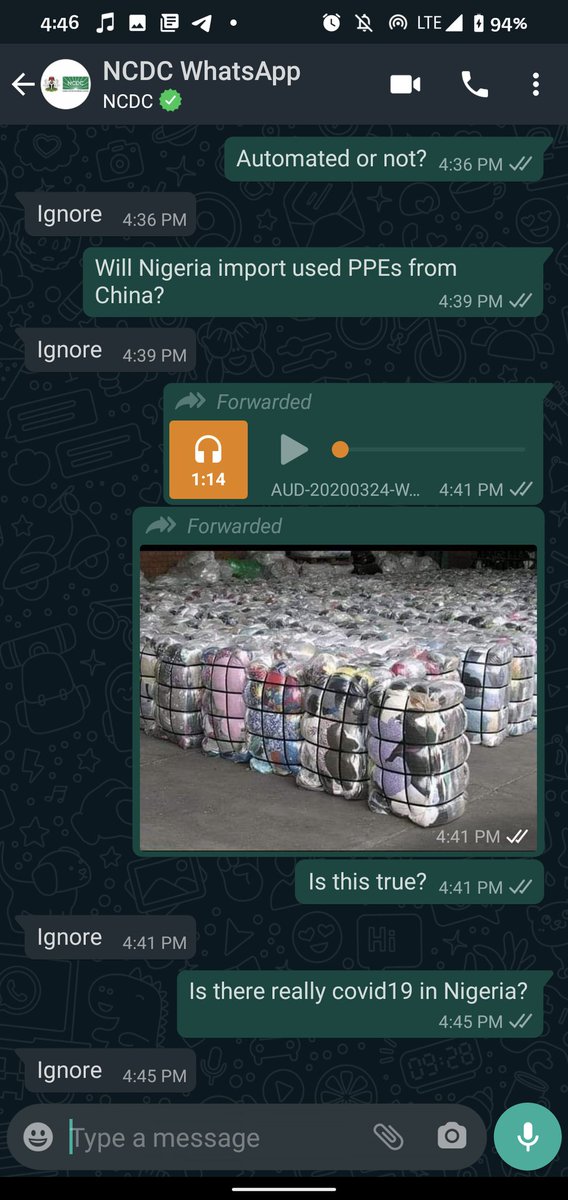Last week, I thought to work on a general piece to help readers avoid the landmines of misinformation on @WhatsApp, one of the biggest platforms for sharing misinformation in Africa. I asked the @NCDCgov WhatsApp line some questions, and this https://abs.twimg.com/emoji/v2/... draggable="false" alt="👇🏽" title="Down pointing backhand index (medium skin tone)" aria-label="Emoji: Down pointing backhand index (medium skin tone)"> happened. THREAD. Please RT.
https://abs.twimg.com/emoji/v2/... draggable="false" alt="👇🏽" title="Down pointing backhand index (medium skin tone)" aria-label="Emoji: Down pointing backhand index (medium skin tone)"> happened. THREAD. Please RT.
Since the outbreak of #COVID19, misinformation has been on the rise. @AFPFactCheck has written 287 fact-checks in English alone, debunking claims shared millions of times on @Facebook, @Twitter and @instagram. But WhatsApp has been a challenged due to its end-to-end encryption
According to Facebook, the parent company, there are at least 65 BILLION messages sent on WhatsApp DAILY. But WhatsApp privacy challenge makes it impossible for fact-checkers to know how many of these 65 billion messages are laced with #COVID19 misinformation.
So we decided to raise our concerns with WhatsApp and Facebook. WhatsApp says it has made sharing misinformation difficult by recently toughening its policies including banning spam accounts and setting a limit on forwarding messages that do “not originate from a close contact”.
Seeing how unreliable the #NCDC WhatsApp line is, based on my experience, I raised it in this EXPLAINER https://abs.twimg.com/emoji/v2/... draggable="false" alt="👇" title="Down pointing backhand index" aria-label="Emoji: Down pointing backhand index"> for @AFPFactCheck, and spoke with contacts at @NCDCgov. We have since seen some changes but you& #39;d have to tell us, if the line helps: https://factcheck.afp.com/how-spot-covid-19-misinformation-whatsapp">https://factcheck.afp.com/how-spot-...
https://abs.twimg.com/emoji/v2/... draggable="false" alt="👇" title="Down pointing backhand index" aria-label="Emoji: Down pointing backhand index"> for @AFPFactCheck, and spoke with contacts at @NCDCgov. We have since seen some changes but you& #39;d have to tell us, if the line helps: https://factcheck.afp.com/how-spot-covid-19-misinformation-whatsapp">https://factcheck.afp.com/how-spot-...
You don’t need to be a digital verification specialist to spot false or misleading #COVID19 claims. With fact-checking colleagues across @AFPAfrica, we came up with this DIY process for you to spot misinformation on WhatsApp. Here are a few pointers: https://factcheck.afp.com/how-spot-covid-19-misinformation-whatsapp">https://factcheck.afp.com/how-spot-...
If you remain unsure about any claim and would like us to check the claim(s), you can reach out to the AFP Whatsapp line here: +33 6 32 99 52 64
Thank you.
Thank you.
Hello guys,
Finally, this: https://twitter.com/NCDCgov/status/1248936412113756163?s=19">https://twitter.com/NCDCgov/s...
Finally, this: https://twitter.com/NCDCgov/status/1248936412113756163?s=19">https://twitter.com/NCDCgov/s...

 Read on Twitter
Read on Twitter happened. THREAD. Please RT." title="Last week, I thought to work on a general piece to help readers avoid the landmines of misinformation on @WhatsApp, one of the biggest platforms for sharing misinformation in Africa. I asked the @NCDCgov WhatsApp line some questions, and thishttps://abs.twimg.com/emoji/v2/... draggable="false" alt="👇🏽" title="Down pointing backhand index (medium skin tone)" aria-label="Emoji: Down pointing backhand index (medium skin tone)"> happened. THREAD. Please RT." class="img-responsive" style="max-width:100%;"/>
happened. THREAD. Please RT." title="Last week, I thought to work on a general piece to help readers avoid the landmines of misinformation on @WhatsApp, one of the biggest platforms for sharing misinformation in Africa. I asked the @NCDCgov WhatsApp line some questions, and thishttps://abs.twimg.com/emoji/v2/... draggable="false" alt="👇🏽" title="Down pointing backhand index (medium skin tone)" aria-label="Emoji: Down pointing backhand index (medium skin tone)"> happened. THREAD. Please RT." class="img-responsive" style="max-width:100%;"/>


